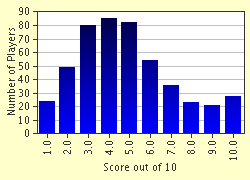Quiz Answer Key and Fun Facts
1. Alexander was born on 21st July 356 BC in Pella. Son to the great King Philip II of Macedon and Olympias, princess of Epirus. Some other myths would have it that he was the son of Zeus and Olympias. On the eve of his birth there was another great event that scarred history. What happened?
2. Alexander was brought up in Pella, which now lies in ruins in modern Greece. His father, Philip II, spared no expense with his sons education and had the famous Aristotle teach him. Aristotle came from Athens, but who was Aristotle's teacher?
3. Who killed Philip II of Macedon?
4. Alexander took the title of King after his father's death. For years Philip had gathered the strength of the Macedonians for the eventual war against the Persians. Though young, Alexander stepped into his father's shoes and declared war against the Persians. But before he stepped into Asia he consulted the Oracle at Delphi for one of its famous prophecies. But unfortunatly, it was a day when the Oracle was forbidden to prophesy. Alexander attempted to drag the priestess to the temple. Realizing that nothing would stop him, the priestess gave Alexander an answer. What did the priestess say?
5. How many points are there on the Argead Star?
6. Ironically, Alexander the Great said these words when he heard of his father's conquests. What did he say?
7. Alexander's famous horse was named Bucephalus. The name Bucephalus has another meaning. What is it?
8. When Alexander was learning how to make offerings to the gods he threw two whole handfuls of incense into a sacred fire. His tutor was furious with such waste and told the child off, saying "When you've conquered the spice-bearing regions, you can throw away all the incense you like. Till then, don't waste it". Who was tutor?
9. Alexander did not live in Pella for the duration of his education under Aristotle. The boy-prince was sent to a little rural sancturary near the Macedonian capital, Pella. Where did Alexander and his companions go?
10. In 340 BC, Alexander was named regent of Macedonia in Philip's absence. Philip, who was away fighting, had given his son the power to rule over his kingdom. During Alexander's time as regent, the Maedi of northen Macedonia revolted. Alexander, doing as a ruler must, crushed the revolt and established a Greek colony. What was its name?
Source: Author
durendal
This quiz was reviewed by FunTrivia editor
bloomsby before going online.
Any errors found in FunTrivia content are routinely corrected through our feedback system.


